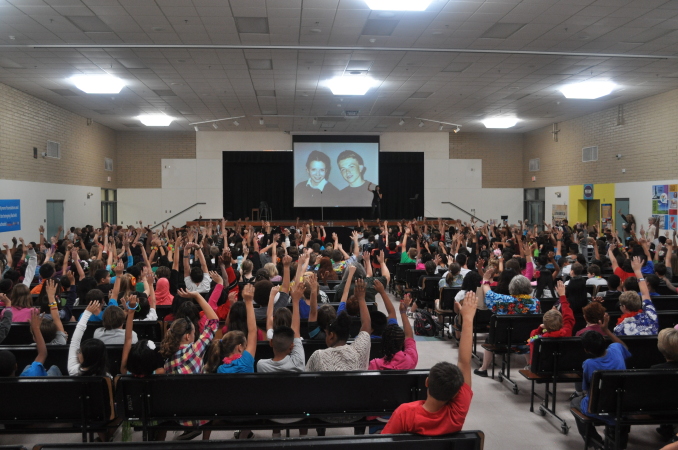On April 20, 1999, two students from Columbine High School in Colorado shot and killed 12 classmates and one teacher. It was the worst high school shooting in the nation’s history.
This year, on Oct. 25, about 1,200 students from Kyrene Middle School in Tempe gathered in the multipurpose room during back-to-back assemblies to learn about the life of one of the victims, a 17-year-old named Rachel Scott.
The purpose of the poignant program—called Rachel’s Challenge—was not to dwell on the violent way in which Rachel lost her life that tragic spring day, but rather to focus on how she lived it: by caring about and being nice to others, and inspiring students to do the same.
By helping to encourage kindness and compassion, the program teaches students ways to combat bullying and prevent feeling isolated.
Kyrene Middle School is just one of the local schools that is taking part in the Rachel’s Challenge program. The Kyrene School District partnered with the Tempe Diablos, the Kyrene Foundation and 3TV to provide the special opportunity to all of the district’s middle school students during the next several months.
Gregory Stainton, president of the Tempe Diablos, said the organization saw Rachel’s Challenge as a proactive program that that could not only help schools deal with bullying but help save the lives of children contemplating suicide.
“If we can be part of something that helps stop one suicide or help a young person with low self-esteem understand how important they are, or help a bully understand how devastating their actions and words can be, we want to throw our support behind it.”
During the program, a young presenter named Katie told the crowd about Rachel’s life and the events at Columbine. The students sat in absolute silence as they watched a video showing news clips of the fateful day, and heard the voice of a frantic teacher calling 911.
Rachel had kept a journal, Katie said. After Rachel’s death, both her writings and some of her essays for class were made public. The theme throughout Rachel’s work was one of love and acceptance.
“I have this theory that if one person can go out of their way to show compassion, then it will start a chain reaction of the same. People will never know how far a little kindness can go,” Rachel wrote in an essay for school.
One month later, she was gone.
During the assemblies, Katie gave the students five specific challenges to think about and use in their everyday lives—each of them inspired by the life and writings of Rachel.
The first, Katie said, is to “Look for the Best in Others—Eliminate Prejudice.” She explained how she herself had been guilty of pre-judging those around her, using what they looked like or were wearing to determine what kind of people they were.
Quoting Rachel’s writings, Katie reminded the students to “look hard enough and you will always find a light.”
The other four challenges which Katie discussed during breaks in the documentary—also featuring powerful interviews with Rachel’s family and friends as well as video that was taken during her young life—were “Treat Others the way You Want to be Treated;” “Choose Positive Influences;” “Speak Words of Kindness—Words can Hurt, Words can Heal;” and “Forgive Yourself and Others.”
In addition to the student assemblies held that morning, the Rachel’s Challenge program included Student Ambassador Training for about 125 KMS students and a parent presentation during a later evening session.
KMS Principal Jama Nacke said it was important to bring Rachel’s Challenge to the school because it is vital that all students feel valued and respected while on campus.
“We place great strength on our diversity and understand that middle school students need training to acquire the necessary inner personal skills to navigate through their adolescence,” Nacke said, adding that KMS also values the importance of the positive messages contained in Rachel’s Challenge.
“Instead of ‘anti-bullying,’ their messages are spreading kindness to everyone and the power of individuals coming together to create a culture of acceptance through empowerment.”
Ross Robb, who is on the governing board for the Kyrene School District, said he was definitely impacted by the quality of the program.
“What struck me about Rachel’s Challenge is that although it talks about Columbine and the loss of Rachel’s life, it’s really more about the validity of the program and the importance of going forward.”
Amanda Hamm, a prevention manager for the district, said she feels the program has a definite impact on students at the same time offering something they can relate to.
“The message is just so beautiful, how one student can have such a huge impact on others. Rachel’s story is just so inspiring.”
Hamm said she feels that middle school is the ideal age to be part of Rachel’s Challenge.
“It’s an age group where kids are trying to become their own people,” she said.
But this is really so much more than an anti-bullying program, it’s about reaching out, being kind and having goals—and then seeing the examples of a young student who did just that.”
For more information about Rachel’s Challenge, visit http://www.rachelschallenge.org

[the_ad_placement id="below-menus"]
Memories of Columbine keep awareness alive
[the_ad_placement id="bottom-post"]

